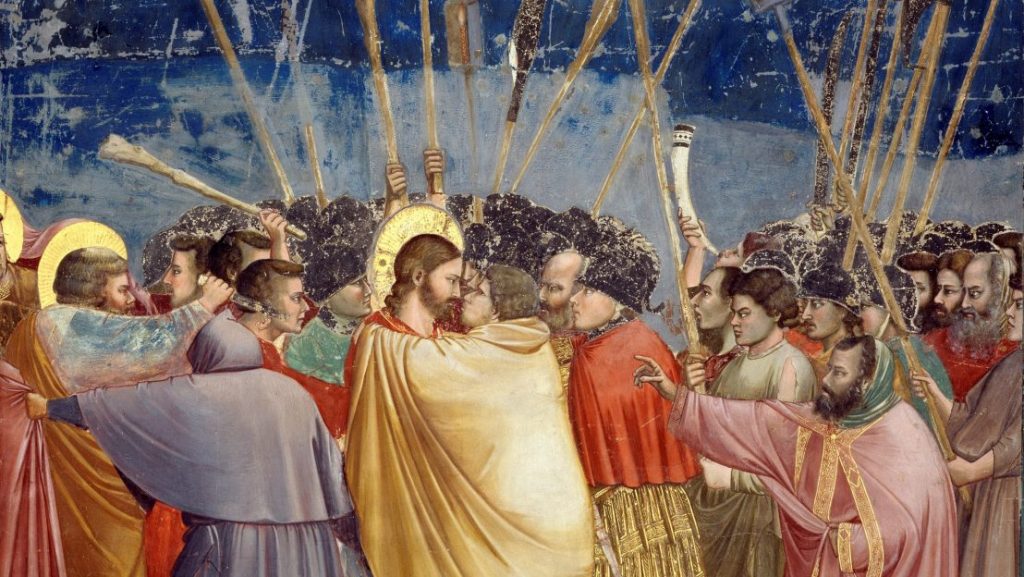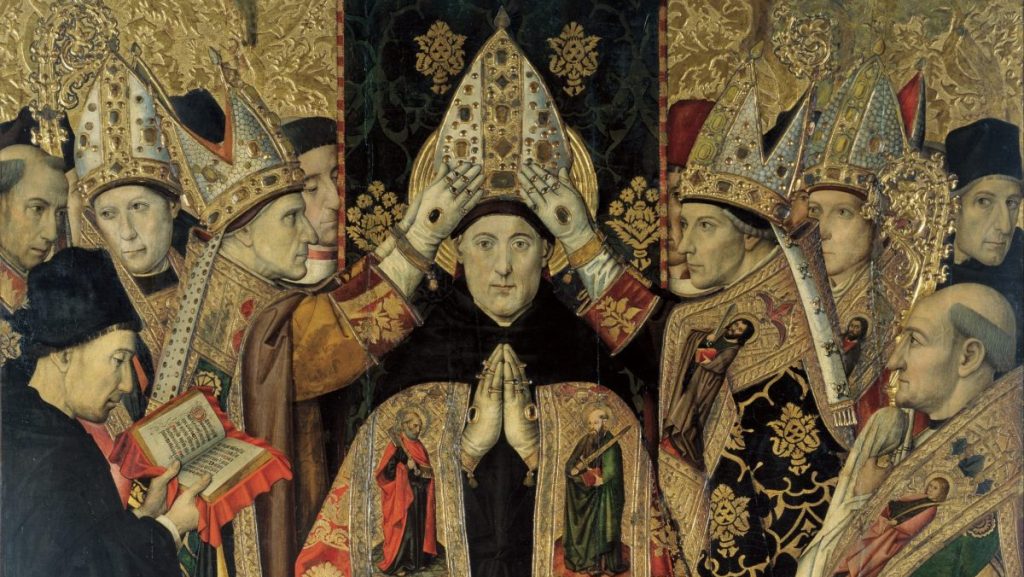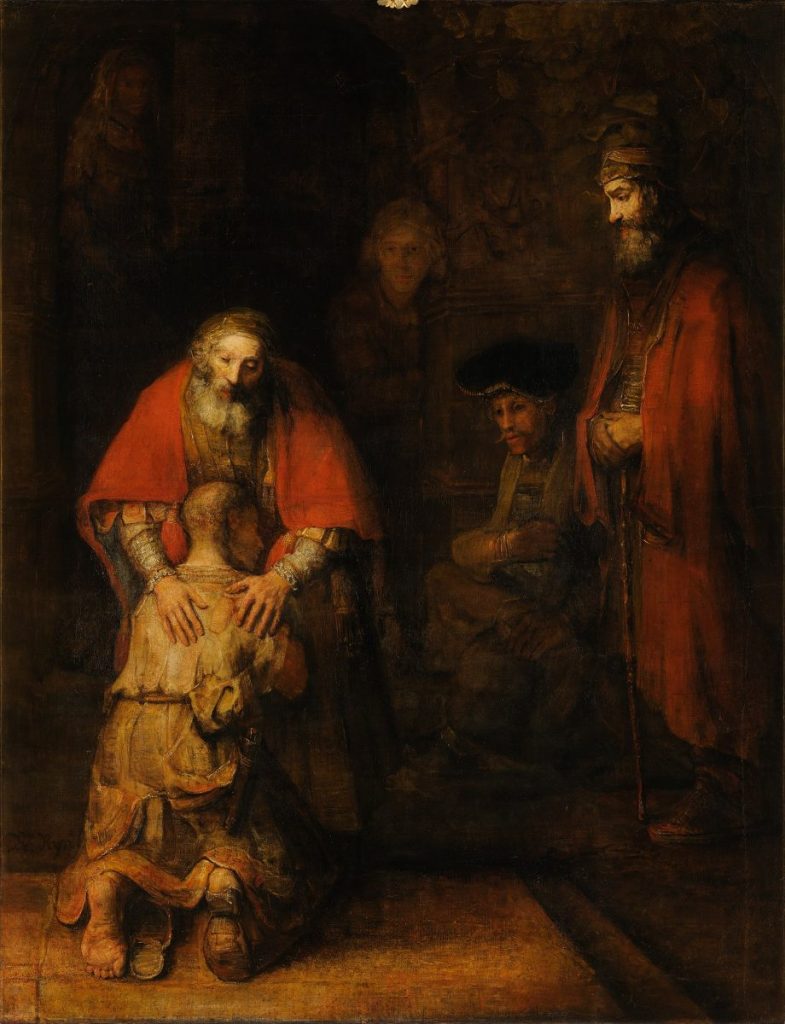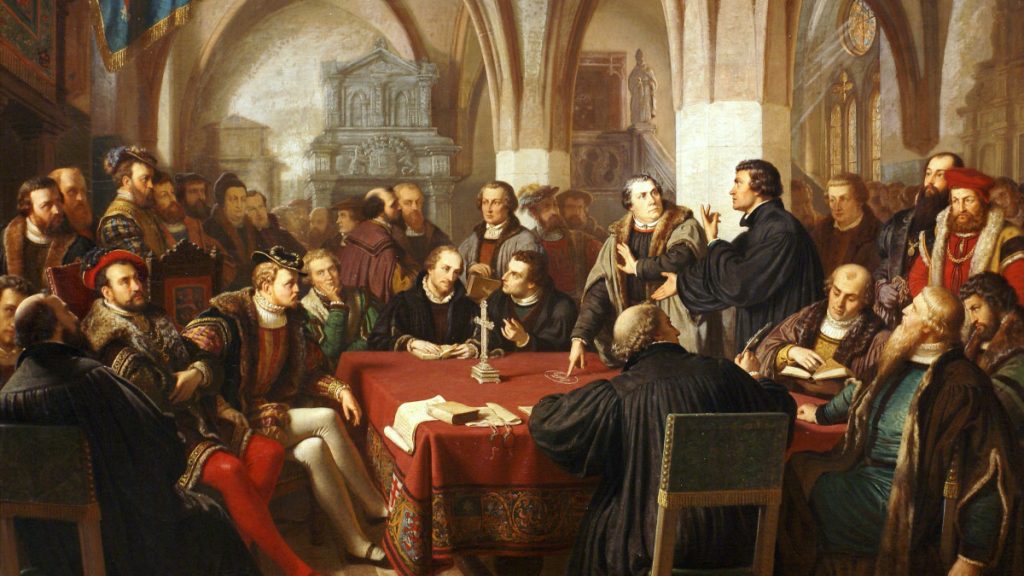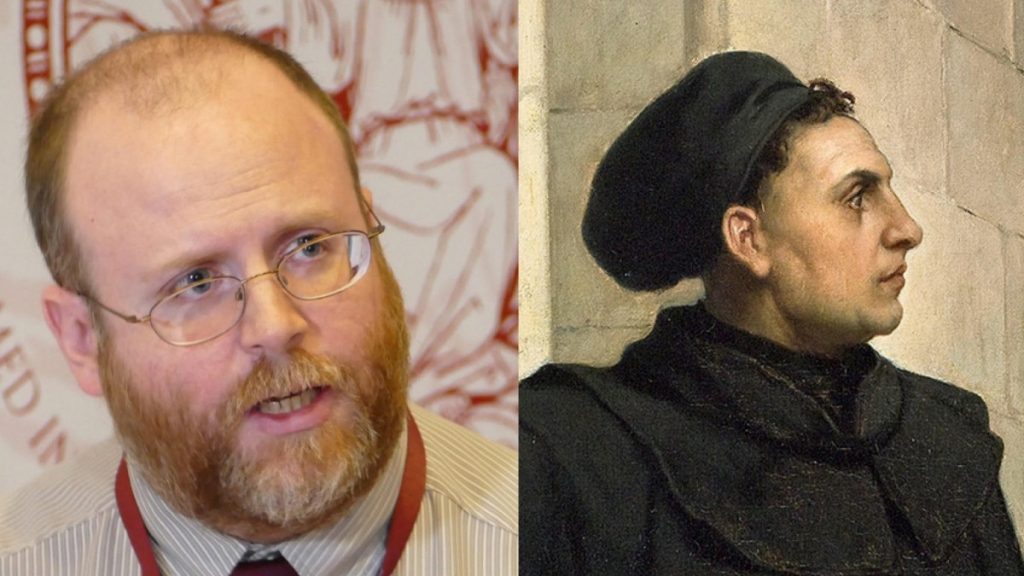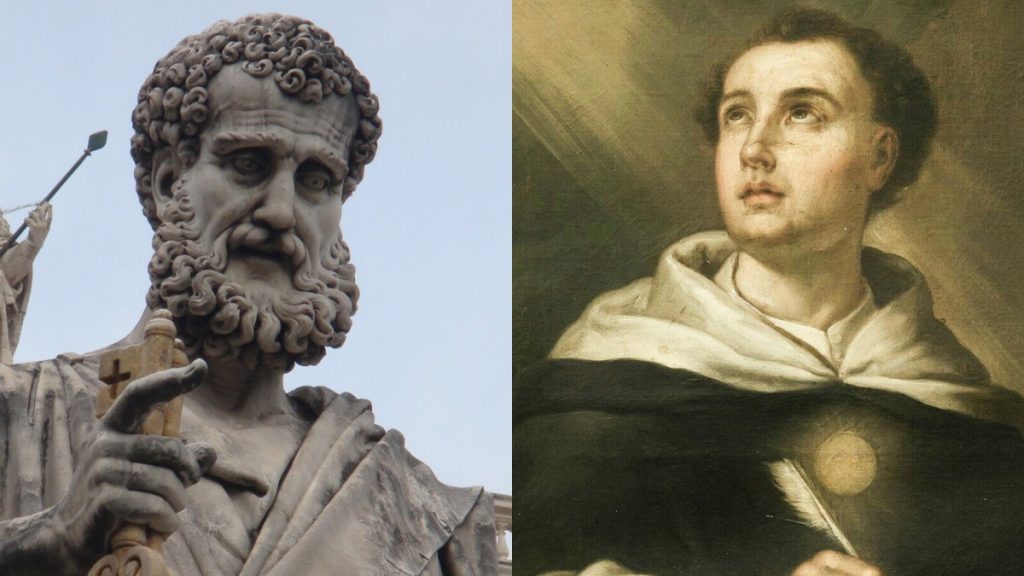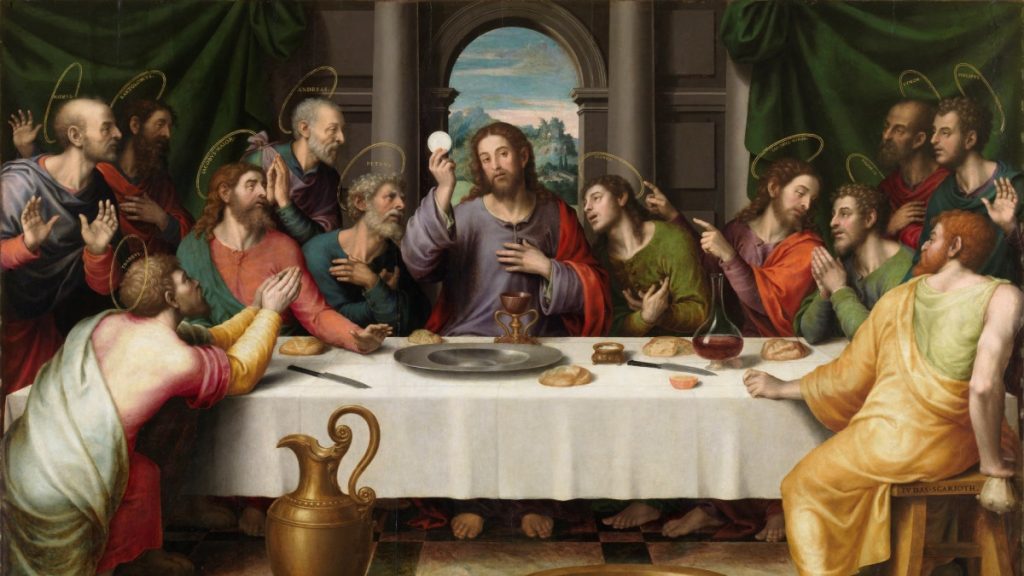(Updated July 16, 2025)
St. Nicetas of Remesiana (c. 335-414) | WEST
St. Nicetas of Remesiana, Explanation of the Creed
(§10)1
After the confession of the Blessed Trinity, you profess faith in the Holy Catholic Church. The Church is simply the community of all the saints. All who from the beginning of the world were or are or will be justified—whether Patriarchs, like Abraham, Isaac, and Jacob, or Prophets, whether Apostles or martyrs, or any others—make up one Church, because they are made holy by one faith and way of life, stamped with one Spirit, made into one body whose head, as we are told, is Christ. I go further. The angels and virtues and powers in heaven are co-members in this one Church, for, as the Apostle teaches us, in Christ “all things whether on earth or in heaven, have been reconciled” (Col. 1:18, 20). You must believe, therefore, that in this one Church you are gathered into the Communion of Saints. You must know that this is the one Catholic Church established throughout the world, and with it you must remain in unshaken communion. There are, indeed, other so-called “churches” with which you can have no communion: for example, those of the Manichaeans, the Cataphrygians, the Marcionites, and other heretics and schismatics. These “churches” ceased to be holy, because they were deceived by the doctrines of the Devil to believe and behave differently from what Christ commanded and from the tradition of the Apostles.
St. Augustine (354-430) | WEST
St. Augustine, On Faith and the Creed (393)
Inasmuch, I repeat, as this is the case, we believe also in The Holy Church, [intending thereby] assuredly the Catholic. For both heretics and schismatics style their congregations churches. But heretics, in holding false opinions regarding God, do injury to the faith itself; while schismatics, on the other hand, in wicked separations break off from brotherly charity, although they may believe just what we believe. Wherefore neither do the heretics belong to the Church catholic, which loves God; nor do the schismatics form a part of the same, inasmuch as it loves the neighbor, and consequently readily forgives the neighbor’s sins, because it prays that forgiveness may be extended to itself by Him who has reconciled us to Himself, doing away with all past things, and calling us to a new life. And until we reach the perfection of this new life, we cannot be without sins. Nevertheless it is a matter of consequence of what sort those sins may be.
St. Augustine, The Creed: A Sermon to the Catechumens
It follows after commendation of the Trinity, “The Holy Church.” God is pointed out, and His temple. “For the temple of God is holy,” says the Apostle, “which (temple) are you” (1 Cor. 3:17). This same is the holy Church, the one Church, the true Church, the Catholic Church, fighting against all heresies: fight, it can: be fought down, it cannot. As for heresies, they went all out of it, like as unprofitable branches pruned from the vine: but itself abides in its root, in its Vine, in its charity. “The gates of hell shall not prevail against it” (Matt. 16:18).
St. Peter Chrysologus (c. 380-c. 450) | WEST
St. Peter Chrysologus, Sermon 57: On the Apostles’ Creed: To the Catechumens2
“The holy Catholic Church”–yes, because neither are the members separated from the head, nor the spouse from her husband. But, by such a union, the Church becomes one spirit; she becomes all things, and God is in them all. Therefore, he believes in God who acknowledges the holy Church as something united to God.
St. Peter Chrysologus, Sermon 58: Third Sermon on the Creed
(§12)3
And the holy Church, as though united to Christ, in order to be conveyed to the full glory of divinity.
St. Peter Chrysologus, Sermon 59: Fourth Sermon on the Creed
(§14)4
And the Holy Church. We also believe in the Church, 228 | 229 which we believe and profess has been received and confirmed into Christ’s glory.
St. Peter Chrysologus, Sermon 60: Fifth Sermon on the Creed
(§14)5
We believe in the holy Church, which Christ took to himself in such a way as to make her a sharer in his divinity.
St. Peter Chrysologus, Sermon 61: On the Apostles’ Creed: To the Catechumens6
“I believe in the Holy Church”–that you may acknowledge that the Church, the Bride of Christ, will remain in everlasting union in Him.
St. Peter Chrysologus, Sermon 62: Seventh Sermon on the Creed
(§15)7
In the holy Church: because the Church is in Christ, and Christ is in the Church. The one who confesses the Church has professed that he has believed in the Church.
St. Peter Chrysologus, Sermon 62A: Eighth Sermon on the Creed
(§11)8
The Holy Church: insofar as she herself is the Body of Christ, and her head is Christ. So we profess Christ in the Holy Church.
St. Quodvultdeus of Carthage (died c. 450) | WEST
St. Quodvultdeus of Carthage, First Homily on the Creed
(§13)9
Holy church [the article to be commented on], in whom the entire authority of this mystery has its boundaries–mother and virgin, chaste in body, fruitful in offspring, declared earlier to be bride of Christ. With devotion she nourishes her children, whom she strives zealously to signify as worthy of God the Father. Good children, love such a marvelous mother; good children, do not turn your back on the one who seeks you out daily; repay her by loving the one who loves you. She is great and of such nobility that she is a queen fruitful in offspring. Do not allow her to suffer or to be weakened from the insults and plots of either evil children or worthless servants. Defend the cause of your mother; display her magnificent dignity. Do not permit the worthless servant to abuse the mistress. Do not permit the Arian heretic to revile the church. He is a wolf, recognize it; he is a serpent, dash his head. He flatters, but deceives; he promises a lot, but defrauds. Come, he says, I will defend you; if you are in need, I will feed you; if naked, I will clothe you. I will give you money, I will arrange it in such a way that a person may receive something every day. O evil wolf! O wicked serpent! O wretched servant! You scorn your mistress, you assail your true mother; in rebaptizing the Catholic, you foreswear Christ; and, what is the rock bottom of your craftiness, some you compel with force, in order to destroy them, on others you press money which results in their death.
Heretic, are you not really clothing the naked, in order to strip from within one clothed with Christ? are you not really feeding the hungry, in order to take away the heavenly food of the soul?
Are you not giving money for this reason, that those wretches may sell Christ for the purpose of re-baptism, just as Judas once sold Christ to the Jews for the purpose of crucifying 49 | 50 him? “May your money go with you to perdition” (Acts 8:20).
Heretic, you do far worse than the Jew did. For behold, although the Jew [Judas] was paid a reward for the purpose of killing Christ, and then only once pierced his side as he hung on the cross, still, he preserved his whole body intact.
But you, indeed, pay money every day with the result that you cut off different bodily members of the One who sits in heaven.
But may you, beloved, who have been nourished from the breasts of Holy Mother the Church in the beginning and have been weaned by her to solid food, remain dwelling in her.
If any one of her [children], who has borne either a discipline or an admonition with bitterness and has departed angry, may such a one acknowledge her as mother and return to her. For her part, she freely accepts those whom she seeks out and rejoices that a child who was lost has been turned back.
Nonetheless, although she rejoices much over the one who was lost and has been turned back, she does not cease proclaiming the worth and steadfastness of those children who stay with her to the end.
St. Quodvultdeus of Carthage, Second Homily on the Creed
(§12)10
The person who is not in the church of God is able neither to love nor to hold him dear; for everyone outside it is not with God, who is eternal life. The last part of this mystery [of the creed] is completed through the church–that mother fertile, virginal, and chaste, spread abroad everywhere, who bears spiritual children for God, who nourishes infants spiritually with the milk of his words, who teaches little children wisdom, who guards with her chastity adolescents against unbridled excess and impurity, who arms young men with the strength of virtue against the devil, who teaches the old prudence, and who makes the more advanced in age venerable. Through her, young men and women, the old along with the young, every age group, and both sexes, praise the name of the Lord. She recalls the wandering children, deeply laments the dead, and 65 | 66 feeds with himself those who persevere without fail. This church, beloved, let us love; may all of us cleave inseparably to such a mother, so loving, so caring, so mindful. With and through her thus may we deserve to be perpetually united to God the Father. Amen.
St. Quodvultdeus of Carthage, Third Homily on the Creed
(§13)11
[I believe] in the Holy Church [the article about to be commented on]. Because the boundaries of this sacrament are established by the holy church, should anyone have been found outside them, such a one will be estranged from the members of her family. For one who does not wish to have the church for one’s mother does not have God for one’s Father. Indeed, nothing that one has believed or done, however extensive the good [of it], outside the boundary of the highest good will be efficacious. Mother Church is spiritual: the church is the bride of Christ–his grace, which was once endowed with his precious blood, is now made white. She possesses everything that she received from her husband as a dowry. I read his matrimonial contract; I will recite it. Listen, heretics, to what was written: “It was necessary for Christ to die and to rise from the dead, and for repentance and remission of sins to be preached in his name among all the nations” (Luke 24:46-47). “All the nations” means the whole world. The church possesses everything that she received from her husband as a dowry. Whatsoever congregation lurks in the corner of any heresy, is a concubine, not a married 81 | 82 woman. O Arian heresy, why do you scoff, why do you despise, why seize on so many issues of the moment? [The church] suffers injury from you–the mistress from the handmaid–you inflict much abuse on her. Although she grieves over these things, the holy Catholic bride of Christ is not particularly afraid of you. For when her Spouse has taken stock, you yourself, with your children and your handmaid, will be expelled, because of the sons of the servant girl are not heirs like the freeborn [wife]. Let the one, holy, and true Catholic queen be recognized, the one to whom Christ gave such sovereignty that, spreading her through out the whole world and purifying her from every stain and wrinkle, he fashioned such complete beauty for his coming. Amen.
Footnotes
- St. Nicetas, Sulpicius Severus, St. Vincent of Lérins, St. Prosper of Aquitaine, J. Reginald OʼDonnell, CSB, trans., The Fathers of the Church, Vol. 7: Niceta of Remesiana, Writings; Supicius Severus, Writings; Vincent of Lérins, Commonitories; Prosper of Aquitaine, Grace and Free Will (Washington, DC: The Catholic University of America Press, 1949), 49-50. ↩︎
- St. Peter Chrysologus and St. Valerian, George E. Ganss, S.J., trans., The Fathers of the Church, Vol. 17: Saint Peter Chrysologus Selected Sermons; Saint Valerian Homilies (Washington, DC: The Catholic University of America Press, 2004), 109. ↩︎
- St. Peter Chrysologus, William B. Palardy, trans., The Fathers of the Church, Vol. 109: St. Peter Chrysologus, Selected Sermons, Volume 2 (Washington, DC: The Catholic University of America Press, 2004), 224. ↩︎
- St. Peter Chrysologus, William B. Palardy, trans., The Fathers of the Church, Vol. 109: St. Peter Chrysologus, Selected Sermons, Volume 2 (Washington, DC: The Catholic University of America Press, 2004), 228-29. ↩︎
- St. Peter Chrysologus, William B. Palardy, trans., The Fathers of the Church, Vol. 109: St. Peter Chrysologus, Selected Sermons, Volume 2 (Washington, DC: The Catholic University of America Press, 2004), 236. ↩︎
- St. Peter Chrysologus and St. Valerian, George E. Ganss, S.J., trans., The Fathers of the Church, Vol. 17: Saint Peter Chrysologus Selected Sermons; Saint Valerian Homilies (Washington, DC: The Catholic University of America Press, 2004), 114. ↩︎
- St. Peter Chrysologus, William B. Palardy, trans., The Fathers of the Church, Vol. 109: St. Peter Chrysologus, Selected Sermons, Volume 2 (Washington, DC: The Catholic University of America Press, 2004), 245. ↩︎
- St. Peter Chrysologus, William B. Palardy, trans., The Fathers of the Church, Vol. 109: St. Peter Chrysologus, Selected Sermons, Volume 2 (Washington, DC: The Catholic University of America Press, 2004), 247. ↩︎
- Quodvultdeus of Carthage, Thomas Macy Finn, trans., Ancient Christian Writers, Vol. 60: Quodvultdeus of Carthage, The Creedal Homilies (New York: The Newman Press, 2004), 49-50. ↩︎
- Quodvultdeus of Carthage, Thomas Macy Finn, trans., Ancient Christian Writers, Vol. 60: Quodvultdeus of Carthage, The Creedal Homilies (New York: The Newman Press, 2004), 65-66. ↩︎
- Quodvultdeus of Carthage, Thomas Macy Finn, trans., Ancient Christian Writers, Vol. 60: Quodvultdeus of Carthage, The Creedal Homilies (New York: The Newman Press, 2004), 81-82. ↩︎
